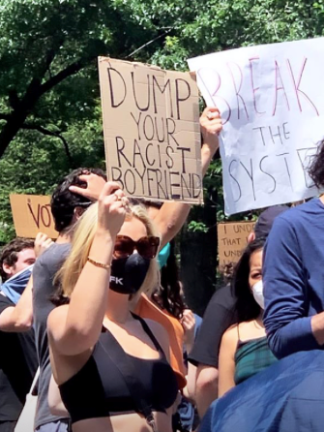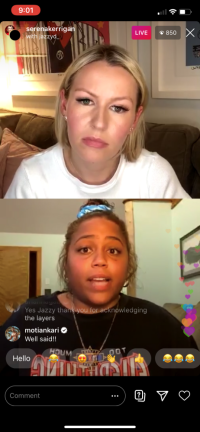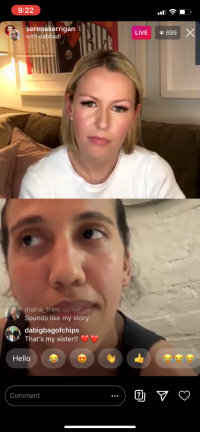Allyship in the Age of Social Media
Influencer Serena Kerrigan turns her focus from women’s empowerment to Black Lives Matter



As protesters have flooded the streets to demand an end to police brutality toward Black Americans, activism has simultaneously flooded social media. The conversation on how to be an ally to the Black Lives Matter movement has accordingly broadened to how to be an ally on social media. At a recent protest, the influencer Serena Kerrigan held up a sign saying, “Dump your racist boyfriend!” and posted the image to her Instagram story. Funny? Provocative? Yes. Frivolous? Absolutely not. In a few simple words, Kerrigan told her followers that being an ally to the black community demands prioritizing anti-racism, even if it means severing ties in your closest relationships.
Since influencers’ “workplace” is on social media, they have direct and immediate access to young audiences in a way the news media doesn’t. Kerrigan’s nearly 60K following on Instagram is 78% female, and of those women, the majority are 18-34, millennials and Generation Z. Most are from New York, followed by Los Angeles, Chicago, London, and Philadelphia.
Kerrigan didn’t set out to be an activist. During quarantine, the 26-year-old launched a live, unedited dating show on Instagram called “Let’s Fucking Date” from her New York City apartment every Wednesday and Friday night. The show empowers women to be themselves on dates and is a subset of her brand, “Serena Fucking Kerrigan” or “SFK,” a persona Kerrigan created while at Duke University to project confidence she yet didn’t have. When the Black Lives Matter movement heated up, Kerrigan pivoted and hosted “Let’s Fucking Talk” on June 4, to give young black people a stage to share their experiences.
Kerrigan’s show titles are provocative and unsanitized. They capture the energy, urgency and honesty with which she delivers her message. Kerrigan said, “I’ve never had the platform that I have until quarantine. It felt completely tone deaf and insensitive to talk about anything other than Black Lives Matter.” During the show, Kerrigan dimmed her comedic persona to listen rather than direct the conversation. Careful never to claim expert status, Kerrigan created “Talk” to educate herself as much as her followers. She said, “If I’m giving my platform, that means I’m handing it off,” but rather than leave the show all together, she added “I wanted to be there, because it’s not on the Black community to teach us. We have to show up and listen.”
After the first episode, she reflected on the history of her brand SFK in a blunt and public way. “Claire [Abbadi] talked about how in college, she went to Middlebury, she couldn’t take up room, because her race took up so much space,” Kerrigan said. “I was thinking about me at Duke. SFK, loud, unapologetic. I took up a lot of space. And to realize that was white privilege shocked me.”
Expanding Her Brand
Although Kerrigan is Latinx, Argentinian, she believes she benefits from white privilege due to her light skin tone. After reflecting on how her brand benefits as a result, Kerrigan has been expanding it to address how race intersects with confidence and self-image. “My brand is all about empowerment so that people can take control of their lives and be unapologetically themselves. Because of systemic racism, that doesn’t apply to Black people,” she said. “I can’t say I want to empower all women if a big part of our country is not empowered at all.”
When the show aired, viewership was wavering at around 900 people, whereas her dating show typically draws over three times that amount. Her guest speakers and followers expressed their disappointment, but Kerrigan was not surprised. “I think people don’t want to talk about it and that they’re uncomfortable or they’re racist.” She also noted, “It came at the end of a week of compressed social media activism, which has never really happened before. I knew that once we posted the video [on Instagram] and it was shared it would get more views.” She was right. As of June 10th, four days after Kerrigan posted the video, she had over 47K views compared to the 13K on her last dating show posted the week before.
Just like her fans, Kerrigan is navigating allyship while the movement is taking place. When the right thing to do gets confusing Kerrigan shows her non-Black fans that, although the fast pace of social media can breed a herd mentality, everyone must commit to consuming viral content critically. On June 2, two Black women in the music industry, Jamila Thomas & Brianna Agyemang, started the hashtag #TheShowMustBePaused to ask music companies to halt operations for the day and reflect on how the industry has long profited from black musicians. However, the hashtag morphed into #BlackoutTuesday and resulted in people posting black squares rather than helpful information.
“Everyone posted the black box, so I thought ok I’m gonna post the black box now,” Kerrigan said. She later questioned her choice, explaining, “It blacked out feeds, which went against the point of amplifying black voices.”
Kerrigan created a poll and asked her followers to reflect on whether they thought the post was productive. She then responded to the messages she received in response. “I was a little embarrassed at first,” she said about her public back and forth on whether or not to delete the post, but “no one said how dare you change your mind. People said thank you for sharing.” Rather than quietly delete the post to save face, Kerrigan’s goal was to start a conversation and learn, and her followers respect her for that.
Even though running her social media is her full-time job, Kerrigan wants her brand to succeed while upholding her values. “Yeah, I’ve lost followers,” she said “It’s a shame, because losing a follower means they won’t see my content and I will continuously be posting about Black Lives Matter.” When Kerrigan came home from a protest and saw someone messaged her asking about the dating show, she thought “Who fucking cares? When you immerse yourself in Black Lives Matter, things are put into perspective. This show, this article of clothing a brand sent me to post, it doesn’t matter. And that’s difficult for me too, because this is my job, and I want to entertain.” Kerrigan hosted a second episode of “Talk” on June 11 in a continued effort to demonstrate and learn what it means to be an ally.
“I can’t say I want to empower all women if a big part of our country is not empowered at all.” Influencer Serena Kerrigan